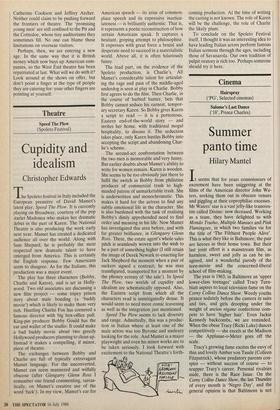Theatre
Speed The Plow (Spoleto Festival)
Cupidity and idealism
Christopher Edwards
The Spoleto festival in Italy included the European premiere of David Mamet's latest play, Speed The Plow. It is currently playing on Broadway, courtesy of the pop starlet Madonna who makes her dramatic debut in the part of Karen. The National Theatre is also producing the work early next year. Mamet has created a dedicated audience all over the world. Along with Sam Shepard, he is probably the most respected new dramatic talent to have emerged from America. This is certainly the English response. Few Americans seem to disagree. As for the Italians, this production was a major event.
The play has three characters (Bobby, Charlie and Karen), and is set in Holly- wood. Two old associates are discussing a new film project — some tripey prison story about male bonding (a 'buddy movie') which is likely to make them very rich. Hustling Charlie Fox has cornered a famous director with big box-office pull. King-pin producer Bobby Gould has the ear and wallet of the studio. It could make a bad buddy movie about two greedy Hollywood producers planning to clean up. Instead it makes a compelling, if minor, piece of theatre.
The exchanges between Bobby and Charlie are full of typically extravagant Mamet language. For the unconverted, Mamet can seem mannered and wilfully obscene (after Glengarry Glenn Ross I remember one friend commenting, sarcas- tically, on Mamet's creative use of the word 'fuck). In my view, Mamet's ear for American speech — its arias of common- place speech and its expressive inarticu- lateness — is brilliantly authentic. That is, it represents a poetic reconstruction of how certain Americans speak. It captures a hesitant, groping attempt to philosophise. It expresses with great force a brutal and desperate need to succeed in a materialistic world. Above all, it is often hilariously funny.
The lead part, on the evidence of the Spoleto production, is Charlie's. All Mamet's considerable talent for articulat- ing the rage and pain of the middle-aged underdog is seen at play in Charlie. Bobby first agrees to do the film. Then Charlie, in the course of barbed banter, bets that Bobby cannot seduce his earnest, tempor- ary secretary Karen. So Bobby gives Karen a script to read — it is a portentous, Eastern end-of-the-world story — and invites her home, with traditional mogul hospitality, to discuss it. The seduction takes place, only Karen hustles Bobby into accepting the script and abandoning Char- lie's scheme.
The second-act confrontation between the two men is memorable and very funny. But earlier doubts about Mamet's ability to write for women remain. Karen is wooden. She seems to be too obviously just there to fulfil the switch in Bobby from philistine producer of commercial trash to high- minded patron of unmarketable trash. She is underwritten and monochromatic. This makes it hard for the actress to find any subtle emotional life in the character. She is also burdened with the task of realising Bobby's dimly apprehended need to find order and meaning in his life. Now Mamet has investigated this area before, and with far greater brilliance, in Glengarry Glenn Ross. There, the estate agent's whole sales pitch is seamlessly woven into the wish to be a part of something higher (I still retain the image of Derek Newark re-enacting for Jack Shepherd the moment when a pair of suckers signed a contract; he was man transfigured, transported for a moment by the phoney ecstasy of 'the sale'). In Speed The Plow, two worlds of cupidity and idealism are schematically opposed. Also, the Eastern script from which all the characters read is unmitigatedly dense. It would seem to need more comic leavening as well as the integration just mentioned.
Speed The Plow seems to lack diversity and range. Admittedly, this was a produc- tion in Italian where at least one of the male actors was too Byronic and unsleazy looking for the role. And Mamet is a major playwright and even his minor works are to be taken seriously. I look forward with excitement to the National Theatre's forth- coming production. At the time of writing the casting is not known. The role of Karen will be the challenge, the role of Charlie the likely plum.
To conclude on the Spoleto Festival itself, I thought it was an interesting idea to have leading Italian actors perform famous Italian sermons through the ages, including those of Savanarola. Our own tradition of pulpit oratory is rich too. Perhaps someone should try it here.


















































 Previous page
Previous page